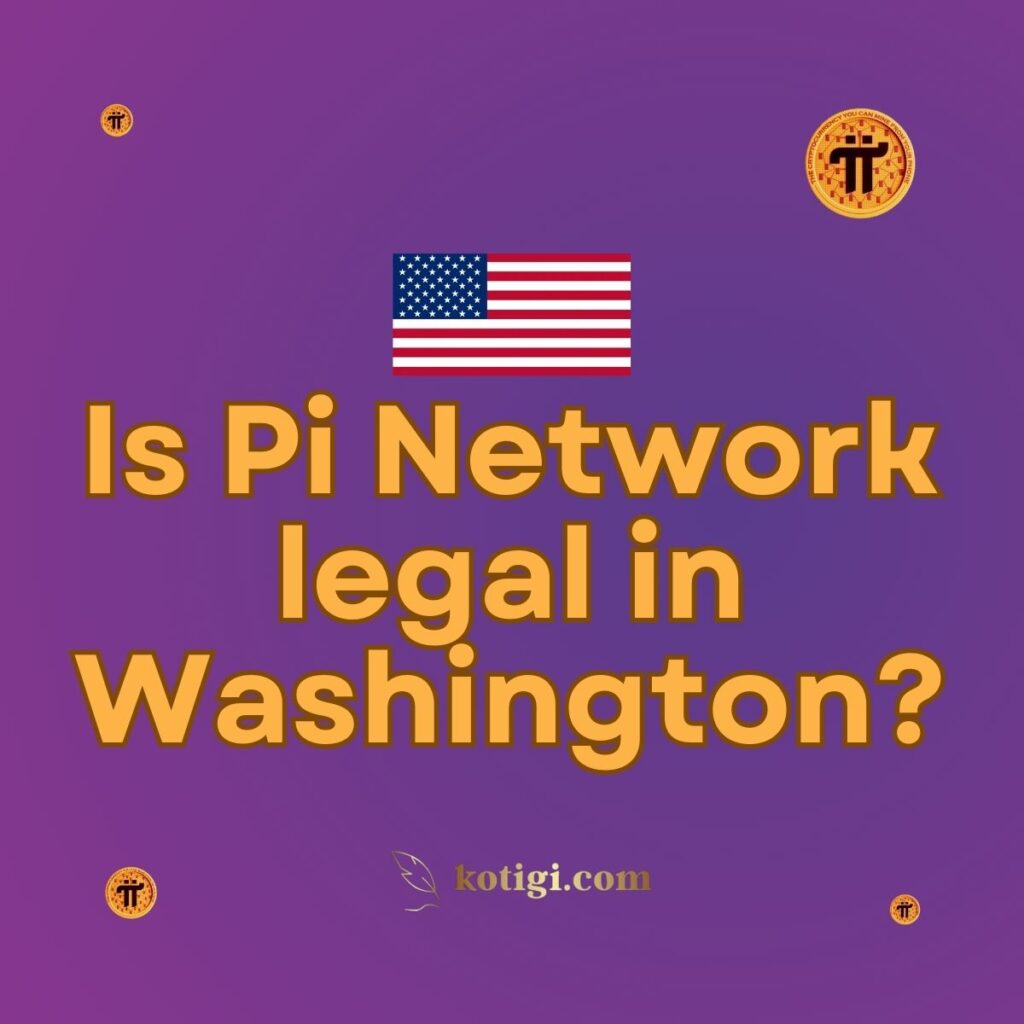
Is Pi Network legal in Washington?
Yes, Pi Network is legal in Washington State. Residents can mine and use Pi tokens without facing specific legal restrictions, but they should stay informed about relevant regulations and ensure compliance with state and federal laws.
Introduction
As the cryptocurrency landscape continues to evolve, platforms like Pi Network are gaining attention for their innovative approach to mining digital currency. With a unique model that allows users to mine Pi tokens directly from their smartphones, Pi Network is designed to be accessible to a wide audience. However, understanding the legal implications of using such platforms is crucial for prospective users. This article explores the legal status of Pi Network in Washington State, covering regulations, compliance requirements, and opportunities for community engagement, ensuring that users can navigate the crypto space with confidence.
1. Overview of Pi Network and Its Legal Standing in Washington
1.1 What is Pi Network?
Pi Network is a cryptocurrency platform that enables users to mine Pi coins using their mobile devices. Unlike traditional mining, which often requires expensive hardware and significant energy consumption, Pi Network offers an accessible alternative. Users can simply download the app, create an account, and start mining, democratizing access to cryptocurrency.
1.2 Washington’s Cryptocurrency Environment
Washington State has established itself as a hub for technological innovation, particularly in the blockchain and cryptocurrency sectors. With various startups and tech companies operating in the area, the state has shown a commitment to fostering an environment conducive to digital currency adoption.
1.3 Legal Framework for Cryptocurrencies in Washington
Currently, Washington does not have laws that specifically prohibit the use of cryptocurrencies, including Pi Network. This lack of specific regulations provides a favorable legal environment for users who wish to mine and utilize Pi tokens.
1.4 Accessibility of Pi Network in Washington
Residents of Washington can easily access Pi Network by downloading the app from popular app stores. The straightforward registration process allows anyone interested in cryptocurrency to participate without legal hurdles.
2. Legal Considerations for Pi Network Users in Washington
2.1 Absence of State-Specific Cryptocurrency Regulations
The lack of state-specific laws regarding cryptocurrencies grants Washington users the freedom to engage with Pi Network without facing significant legal restrictions. This openness fosters a growing cryptocurrency ecosystem in the state.
2.2 Compliance with Federal Regulations
While Washington’s regulatory framework is supportive, users must also comply with federal laws. Agencies like the Securities and Exchange Commission (SEC) and the Internal Revenue Service (IRS) have established guidelines that users should understand to avoid legal complications.
2.3 Data Privacy and Protection Concerns
As Pi Network implements a Know Your Customer (KYC) process for user verification, data privacy becomes a critical issue. Washington users should review the platform’s privacy policy to understand how their personal data is handled, ensuring they are comfortable with the level of information required.
2.4 Future Legislative Developments
Cryptocurrency regulations are dynamic and can change over time. Washington users should stay informed about potential new laws or regulations that could impact their engagement with Pi Network, ensuring they remain compliant and aware of their rights.
2.5 Token Legitimacy and Future Trading Potential
Currently, Pi tokens are not tradable on public exchanges, which raises questions about their legitimacy and future value. Users should keep an eye on official announcements regarding exchange listings to assess the potential future utility of their tokens.
3. Compliance Requirements for Washington Users
3.1 KYC Compliance
To ensure security and prevent fraudulent activities, Pi Network requires users to complete a KYC process. This step is crucial for accessing all platform features and maintaining a secure environment for users. Engaging with the KYC process helps build trust within the Pi Network community.
3.2 Record-Keeping for Tax Purposes
Although Pi tokens may not currently be taxable, maintaining accurate records of mining activities is essential. If Pi tokens increase in value, users will need to have comprehensive records for tax reporting. Keeping track of transactions and earnings is crucial for meeting tax obligations.
3.3 Understanding IRS Guidelines
The IRS treats cryptocurrencies as property, which means any capital gains from cryptocurrency activities could be subject to taxation. Washington users should familiarize themselves with IRS guidelines to ensure compliance and avoid potential penalties.
3.4 Ensuring Account Security
Adopting strong security practices is vital for protecting personal information on Pi Network. Users should create strong passwords, enable two-factor authentication, and be cautious about sharing sensitive information. These measures can significantly enhance the security of Pi Network accounts and help prevent unauthorized access.
4. Engaging with Pi Network in Washington
4.1 Community Involvement Opportunities
Joining local cryptocurrency groups or online forums can provide Washington residents with valuable insights and support. Engaging with like-minded individuals can enhance understanding of Pi Network and the broader cryptocurrency landscape.
4.2 Hosting Educational Events
Organizing or participating in educational workshops focused on blockchain technology and Pi Network can help promote awareness and understanding. By empowering the community with knowledge, Pi Network can drive increased adoption and foster a more informed user base.
4.3 Collaboration with Local Businesses
Local businesses can play a significant role in promoting Pi Network by accepting Pi tokens for goods and services. This practice not only increases the utility of the tokens but also encourages local economic engagement, creating a circular economy beneficial to both users and businesses.
4.4 Leveraging State-Level Blockchain Initiatives
Washington’s interest in blockchain technology presents an opportunity for Pi Network to engage in state-backed initiatives. Collaborating with government entities can enhance visibility and potentially expand the user base in Washington.
4.5 Building a Local User Community
Fostering a local user community through meetups and social media groups can create a supportive network for Pi Network users in Washington. This community can share experiences, provide tips, and enhance overall user engagement.
5. Current and Future Utility of Pi Tokens
5.1 Anticipated Use Cases for Pi Tokens
While Pi tokens are not currently exchangeable, users should consider potential future applications. Possible use cases include transactions within the Pi Network ecosystem, access to services, and participation in decentralized applications (dApps) as the platform develops.
5.2 Importance of Market Listing
If Pi tokens gain traction and are listed on cryptocurrency exchanges, it could provide users with a tangible asset to trade or utilize. Staying informed about potential exchange listings is crucial for users looking to maximize the value of their tokens.
5.3 Speculative Nature of Tokens
Users should approach Pi tokens with caution, treating them as speculative assets until their market value is established. Conducting thorough research and avoiding impulsive investment decisions based on speculation is essential.
5.4 Role of Community Engagement in Token Value
The future success of Pi tokens will depend heavily on community engagement and active participation. A robust user community can drive demand and support the long-term viability of Pi tokens.
6. Legal Implications of Cryptocurrency Transactions
6.1 Federal Standards for Cryptocurrency Transactions
Federal laws govern cryptocurrency transactions in the U.S., which can affect how Washington users interact with platforms like Pi Network. Understanding these standards will help users engage responsibly while minimizing legal risks.
6.2 Implications of State-Level Regulations
While Washington lacks stringent cryptocurrency laws, users should remain vigilant about potential regulatory changes. Keeping abreast of developments is essential for informed participation.
6.3 Tax Obligations for Cryptocurrency Activities
Users should prepare for potential tax implications associated with cryptocurrency holdings. Keeping accurate records of mining activities and transactions is invaluable for future tax compliance.
6.4 Consumer Protection Regulations
Federal consumer protection laws apply to digital currencies, ensuring that users have rights when engaging in cryptocurrency transactions. Washington residents should familiarize themselves with these protections to safeguard their interests.
7. Future Outlook for Cryptocurrency Regulations
7.1 Emerging Federal Legislation
The landscape of cryptocurrency regulations is continuously evolving at the federal level. Washington residents should stay informed about proposed laws that could affect the use of Pi Network and other cryptocurrencies.
7.2 Potential for State-Level Regulatory Developments
As the cryptocurrency market matures, Washington may choose to implement specific regulations addressing digital currencies. Users should be prepared to adapt to new compliance requirements as they arise.
7.3 Industry Standards and Best Practices
As the cryptocurrency industry develops, platforms like Pi Network will likely adopt industry best practices, which could affect user guidelines. Staying informed about these changes will help users navigate the evolving landscape effectively.
7.4 International Regulatory Trends
Global regulatory developments can influence local practices. Washington users should be aware of international trends in cryptocurrency regulations, as they may impact the broader market and the use of platforms like Pi Network.
Conclusion
Pi Network is legal for users in Washington, allowing them to engage with the platform without facing significant restrictions. However, as the regulatory landscape evolves, it’s essential for users to stay informed about potential changes at both state and federal levels. By prioritizing compliance, engaging with local initiatives, and protecting personal data, Washington residents can enjoy a secure and rewarding experience with Pi Network.
Key Takeaways
- Legality Confirmed: Pi Network is fully legal in Washington State, enabling users to mine and utilize the platform without facing specific restrictions.
- Stay Informed on Compliance: Users should remain aware of federal regulations and maintain meticulous records for potential future tax implications.
- Potential Token Utility: While currently not exchangeable, Pi tokens may hold future value and use cases as the platform develops.
- Prioritize Data Security: Understanding Pi Network’s privacy policies and implementing robust security measures will protect personal information from potential threats.
- Engagement Opportunities: Active local involvement through events, partnerships, and community initiatives can significantly enhance Pi Network’s visibility and adoption in Washington, fostering a supportive ecosystem for all users.




